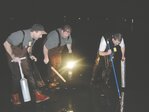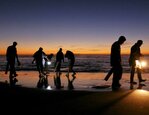

The reasons are twofold. One of them has to do with domoic acid. It’s a toxin found in shellfish and at high levels can cause serious illness if you eat them. Razor clams near Long Beach (one of four razor clam digging beaches) were found to have domoic acid levels that made them unsafe for human consumption. Larry Phillips, the WDFW Coastal Region Manager said, “these toxins have a tendency to hang on – it's not inconceivable that we’ll have to wait until December before we’re clamming again.” So far, razor clams have tested as safe to eat at Washington’s three other beaches (Twin Harbors, Copalis and Moclips).
So why are all of the beaches closed to clamming through November 12? According to the Washington Department of Fish and Wildlife, it’s all about Covid-19 and preventing the spread of it to both clam diggers and the rural communities they visit along the Southwestern Washington Coast.
WDFW opened up razor clamming early this year, starting in September, to increase opportunities for those interested in participating in this activity. It turns out there has been a lot of interest. Jason Wettstein, a WDFW spokesperson, said there have been several days since the September opening that have brought up to 10,000 clam diggers a day visiting the open beaches. Asked whether they are complying with social distance guidelines Wettstein replied, “Some are…and some aren’t”.
The importance of social distancing and wearing masks while visiting ocean beach towns has been a consistent message sent by tourism bureaus and chambers of commerce up and down the coast. These rural communities do not have a robust health infrastructure like large population centers do and there is a real fear the health care providers in these rural settings could be overwhelmed if a Covid-19 outbreak occurs.
Asked about whether increased visitation has caused any outbreaks, Wettstein replied there have been increases in the number of Covid-19 cases in these counties but he stated the healthcare authorities in the affected communities would be the ones to ask about this. Checking the Pacific County Health Department website Covid-19 cases have nearly doubled since the beginning of September from 60 on September 2 to 118 on October 27. However, only eight individuals have been hospitalized for Covid-19 in Pacific County and none have been admitted to hospitals since the middle of August. It is worth noting Covid-19 cases have been rising statewide since September 1 at a similar rate to what Pacific County is reporting so it is unclear what (if any) effect clam digging visitors to Pacific and Grays Harbor Counties are having when it comes to Covid 19 increases.
In spite of this, WDFW officials, after a series of meetings with county health officials along with mayors and county commissioners in this area, all agreed it would be best to close all of the beaches to razor clam digs for now. This prevents large crowds from congregating on the remaining open beaches. This closure is a significant economic hit to these communities. With summer beach goers gone, razor clam digs are a healthy shot in the arm to the hotels, restaurants, stores and shops in these coastal communities.
The next scheduled clam dig is supposed to occur from November 13 and 19. Clams will be tested for toxins a few days before that happens. As for reopening during this continuing season of Covid-19? That will be another joint decision that will come out of meetings between WDFW and local community stakeholders.
In the meantime, you can go clamming along the Northern Oregon Coast but not for razor clams. Unsafe domoic acid levels have been found here too, prompting a closure. However, there are excellent bay clamming opportunities available at Nehalem, Netarts and Tillamook Bay. Just be sure to socially distance and wear a mask when around others.
Comments
No comments on this item Please log in to comment by clicking here